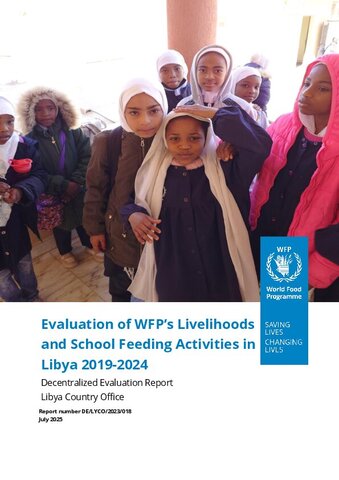
This decentralized evaluation was commissioned in 2024 by the WFP Libya Country Office and covers the WFP’s Livelihoods and School Feeding Activities from 2019-2024. The objective of the evaluation was to inform WFP's transition to a reduced presence and greater reliance on national ownership. It was designed to provide accountability for the use of resources, measure the achievement of results, and generate learning for future program design.
The evaluation assessed the relevance, effectiveness, efficiency, impact, sustainability, and coherence of WFP's activities. It focused on key questions, including:
- The extent to which WFP's intervention was relevant to the needs of the targeted population and government.
- WFP's success in meeting planned results.
- The optimal use of resources.
- The compatibility of WFP's interventions within the country and sector.
- The higher-level effects generated by the intervention and its sustainability.
Key findings included:
- WFP’s activities responded to clear needs and achieved important, localized impacts, demonstrating operational agility and a strong commitment to inclusion and gender-sensitive programming.
- Livelihoods support led to measurable improvements in economic participation for young people and women, while school feeding improved attendance and child nutrition in targeted areas.
- Several structural issues limited the broader transformative potential of the interventions, including weak partnerships, limited national buy-in, and poor data systems.
- The anticipated synergies between livelihoods and school feeding were only partially achieved.
- Limited progress on policy engagement and sustainability planning raises concerns about the durability of these gains post-2024.
Key recommendations from the evaluation included:
- Strengthen strategic coherence by anchoring interventions in geographic and institutional hubs with strong partnerships.
- Develop early frameworks for transition and handover by integrating a sustainability framework into future programming.
- Engage new funding and policy allies to diversify partnerships and elevate WFP's strategic value.
- Improve targeting and contextual analysis by enhancing the use of detailed mapping and gender-disaggregated data.
- Expand outcome monitoring and community feedback systems to go beyond tracking distribution outputs and better inform future planning.
